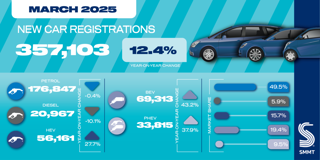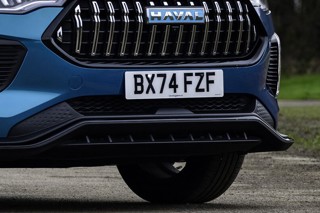New car sales are the crucial driver of success at any franchised dealership. The branding above the door and a competitive product range will underpin profitability, which will only be enhanced by the aftersales and used car opportunities that follow.
However, running a successful new car sales operation relies on many factors. AM asked dealers and suppliers to share their best practice advice.
New customer acquisition
Manufacturers typically take the lead with their national new car marketing and finance offers, but once the consumer has shown interest it becomes the dealer’s business to lose. The retailer’s own marketing needs to echo those messages, across all the traditional and digital media being used,
emphasising the monthly affordability of the new car range as well as the headline list price. Clear online calls to action, such as devices to value their part-exchange or to obtain a finance quote, can bring the consumer another step closer to deciding to visit. Data from Auto Trader has shown 58% of buyers visit the dealership without first making contact, rising to 67% among 17-24-year-olds and among female buyers.
Re-soliciting
Both the dealers’ and finance partners’ customer database should be exploited to identify which existing customers are in a position to change their current car for the new model.
Prospecting events, when the sales team focuses for a set period on calling existing customers to invite them to consider the new car, can work particularly well due to the element of competition and performance incentives. When a sales team’s skills are stronger face-to-face than over the telephone, some dealers may benefit from using outsourced or in-house call centres to do the prospecting for appointments.
At AM100 group Steven Eagell, an in-house call centre at Milton Keynes is staffed by a team of 16, who make thousands of outbound calls per month, using DMS data. As well as seeking to confirm appointments, the staff are also trained to sell add-ons to existing customers.
“It’s another thing that helps free up the sales staff to sell cars. Without the call centre, there would be phones ringing in the showroom and that only detracts from the personal service that we aim to offer,” said managing director Steven Eagell.
Rapid responses
Prospective customers who do make contact online expect a rapid, meaningful response to their enquiries and dealers that fail to deliver that could be headed for a crisis. New car deals website Carwow analysed data from more than 11,000 car purchases made through its website in the first quarter of 2016 and found 50% of consumers said they will go elsewhere if they don’t get a response within an hour.
Cambria Automobiles’ dealerships try to reply to emails “within minutes”, but follow up after 24 hours, 72 hours and 14 days.
Jennings Group has an in-house website operation run by a team of 25, which has resulted in 300-400 sales completed via the internet. Many cars are delivered to their new owners, with customers from as far afield as Tipperary, in Ireland.
Monitor and manage leads
At Volvo dealer group Clive Brook, stringent lead management processes have been put in place to ensure every sales opportunity is maximised after managing director Clive Brook discovered sales were being lost due to poor salesmanship.
He established a DMS system that allowed the business to log data and analyse the performance of sales staff and employed Harrogate-based Cymark Dealer Services to carry out post-enquiry research via follow-up calls. Based on a continuous follow-up of a strictly maintained showroom diary of customer data, these can help to determine if or why a sale was lost.
Brook said: “Why is there this acceptance that six out of your 10 enquiries do not result in a sale of a car? When I took over the business, I had to deal with that fairly quickly because it’s not a statistic I’ve ever been comfortable with.
He said: “I know how the ones who bought cars feel. It’s the people who haven’t bought – the six out of the 10 – . It is expensive, but it’s a low cost relative to the output. For me, that process is probably identifying a car a week. Across the two businesses, that’s a hundred grand.”
Vertu Motors uses a bespoke business management system that allows its leadership team to view the status of all stock, customer enquiries and sales activity in real time. General managers and the senior team can also drill down to examine in detail the performance of any sales executive against a variety of measures, including prospecting activity, customer satisfaction, profitability of their deals and their add-on sales.
Get it right on-site
Human nature means achieving total consistency of experience is nigh impossible, but each customer wants their own experience to be seamless and positive. At Porsche Retail Group, its interactions with customers are “inclusively exclusive”, according to managing director Ade Smith, and a motorist interested in spending £25,000 on a six-year-old Cayman or Boxster needs the experience to feel as special and exciting as one putting a deposit down for a £130,000 911 Turbo Cabriolet.
“If you look at our database, we have people with 30-year-old 924s worth perhaps £9,000 at best that get them serviced here, and we’ve others who’ve just bought a 918 Spyder that’s worth a million euros. The cross-section of our customers is unbelievable. So the first thing we want to make sure is that whoever the customer is, we treat them with complete equality, and the minute they walk through the door they are a Porsche customer,” he said.
At south of England dealer group Picador, chief executive Graham Jacobs believes staff unwilling to put on a smile shouldn’t be working in a dealership. He sets an example by warmly greeting customers when he’s at front of house, and occasionally he gives his team “camp lessons”, as he puts it, to remind members of staff that customers need to be put at ease.
“I have got really good guys, but they look a bit miserable sometimes. So I will say, ‘look at you! If I was wandering in here, I would be terrified to say something to you lot. Put a hand on your hip, smile a bit more, just think a bit more like this.’ They look at me as if I am going mad, but you can’t help but smile and you can’t help but think ‘what Graham is saying is right’.
“They are intimidating places to come into, aren’t they, car dealerships? Really intimidating. So my advice is always give camp lessons. They look at me and think, ‘oh for goodness’ sake, what is he on about now?’
“But they don’t mind it really because what I say is: ‘boys, look I know that you are really nice blokes, every one of you. You are great and you have been so helpful to me over the years. But customers don’t know that – it is the way you are perceived, so put a smile in your voice, smile before you dial’.”
Add value
Kirk Franks, head of national sales at Alphera Financial Services UK, said: “There’s a small window to impress, when buyers visit the dealership towards the end of their purchase journey, so it’s vital to have well trained staff on site. All conversations with buyers are valuable and they get the information they need there and then to go ahead and make their purchase.”
While most dealers have got to grips with what the FCA expects from them, the goal in the showroom now is to make sure that process is consistent.
Jo Jenner, Mann Island Finance managing director, said: “Every customer must be treated fairly and no party should be exposed to unacceptable risks, this has to be central to the finance offering.”
Jenner said an F&I mystery shop of 24 dealerships conducted by Which? in March found shortfalls in the point-of-sale finance experience, including a number of issues obtaining a written finance quotation, with some dealers providing an incomplete quote and others failing to provide any information at all.
The part-exchange
CACI figures show 58% of new car buyers use a car as part-exchange in the purchase. The accuracy of the part-ex appraisal can make a substantial difference in the profit in the deal.
Current best practice of conducting a digital appraisal through a tablet computer means that a set process must be followed – a sales executive cannot progress to the valuation until they have completed specific sections. In addition, such systems feed the data into reporting tools, allowing the sales manager or dealer principal to identify poor practice, such as logging incorrect mileage or service history data or failing to check a spare key is present.
Where possible, the appraisal should also be conducted with the prospective customer alongside, to ensure they see how the value they are quoted has been calculated. It helps to create trust and avoid confrontation.
Barry Cooper, Cooper Solutions managing director and a former BMW dealer principal, said it mustn’t be rushed: “The way the appraisal is done is massively important in
determining whether the customer will do a deal. Every customer will check the value of the vehicle before they come to the showroom. You’ve got to help them understand that you’ve evaluated the tyres, the scratches, the chips, the lack of service history and you can show them why you’re coming to a specific conclusion.
“I think where dealers can go wrong is disappearing to the sales manager’s office and coming back with an offer with no real explanation.”
Offer add-ons
Finance will bring extra income, but largely facilitates the sale, whereas other add-ons such as GAP insurance and paint and fabric protection can boost the profit in the deal significantly. These should be promoted on the website, in the showroom and form part of the discussion with the customer, ideally identifying whether they had bought them before.
Alan Graham, key account manager with Supagard, believes that, like all other business, paint protection should be judged on the criteria of “treating customers fairly and with confidence in the efficacy of the product”. He said dealers could expect a 40% to 50% sales penetration, with top performers achieving up to 80%, and typical gross margin of nearly £350.
Manage complaints carefully
Occasionally, problems with the new car let down the hard work of winning the sale, and it is here that the dealer group needs a process for handling complaints well to avoid the customer rejecting their vehicle.
Graham Jones, Lawdata director of legal services, said there has been an increase in consumers’ challenges in light of the Consumer Rights Act 2015. However, he said it has only brought increased structure and focus from dealers looking to protect themselves in return.
Jones said while dealers tend to prefer to solve problems on the phone, it is better from a legal standpoint to keep things in writing.
He said: “It’s a balance, because you want to keep things personable, but in writing there’s less chance for there to be any confusion by what anyone means and there’s a record of what has been agreed and said.”
In the first instance, dealers will want to resolve matters as quickly as they can, perhaps as a matter of goodwill towards the customer, but legal advice is recommended.
“It’s important to recognise that there’s eight weeks for a final response, so you’ve got that time to come up with a solution, it doesn’t mean you need to rush a final response before that eight-week deadline.”






















Login to comment
Comments
No comments have been made yet.